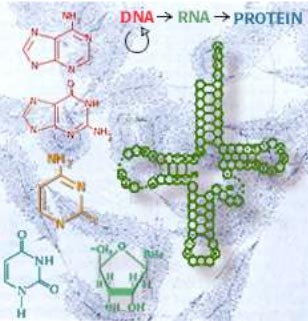Concept 21 RNA is an intermediary between DNA and protein.

DNA is found mostly in the cell nucleus, but another type of nucleic acid, RNA, is common in the cytoplasm. Watson and Crick proposed that RNA must copy the DNA message in the nucleus and carry it out to the cytoplasm, where proteins are synthesized. Crick also predicted the existence of an "adaptor" molecule that reads the genetic code and selects the appropriate amino acids to add to a growing polypeptide chain. This proposed flow of genetic information from DNA to RNA to protein became known as the "Central Dogma."
As it turned out, several types of RNA are involved in the utilization of genetic information. In the nucleus, the DNA code is "transcribed," or copied, into a messenger RNA (mRNA) molecule. In the cytoplasm, the mRNA code is "translated" into amino acids. Translation is orchestrated at the ribosome — itself partly composed of RNA — with transfer RNA playing the role of adaptor.
 DNA and proteins are key molecules of the cell nucleus.
DNA and proteins are key molecules of the cell nucleus. One gene makes one protein.
One gene makes one protein. A gene is made of DNA.
A gene is made of DNA. Bacteria and viruses have DNA too.
Bacteria and viruses have DNA too. The DNA molecule is shaped like a twisted ladder.
The DNA molecule is shaped like a twisted ladder. A half DNA ladder is a template for copying the whole.
A half DNA ladder is a template for copying the whole. RNA is an intermediary between DNA and protein.
RNA is an intermediary between DNA and protein. DNA words are three letters long.
DNA words are three letters long. A gene is a discrete sequence of DNA nucleotides.
A gene is a discrete sequence of DNA nucleotides. The RNA message is sometimes edited.
The RNA message is sometimes edited. Some viruses store genetic information in RNA.
Some viruses store genetic information in RNA. RNA was the first genetic molecule.
RNA was the first genetic molecule. Mutations are changes in genetic information.
Mutations are changes in genetic information. Some types of mutations are automatically repaired.
Some types of mutations are automatically repaired.